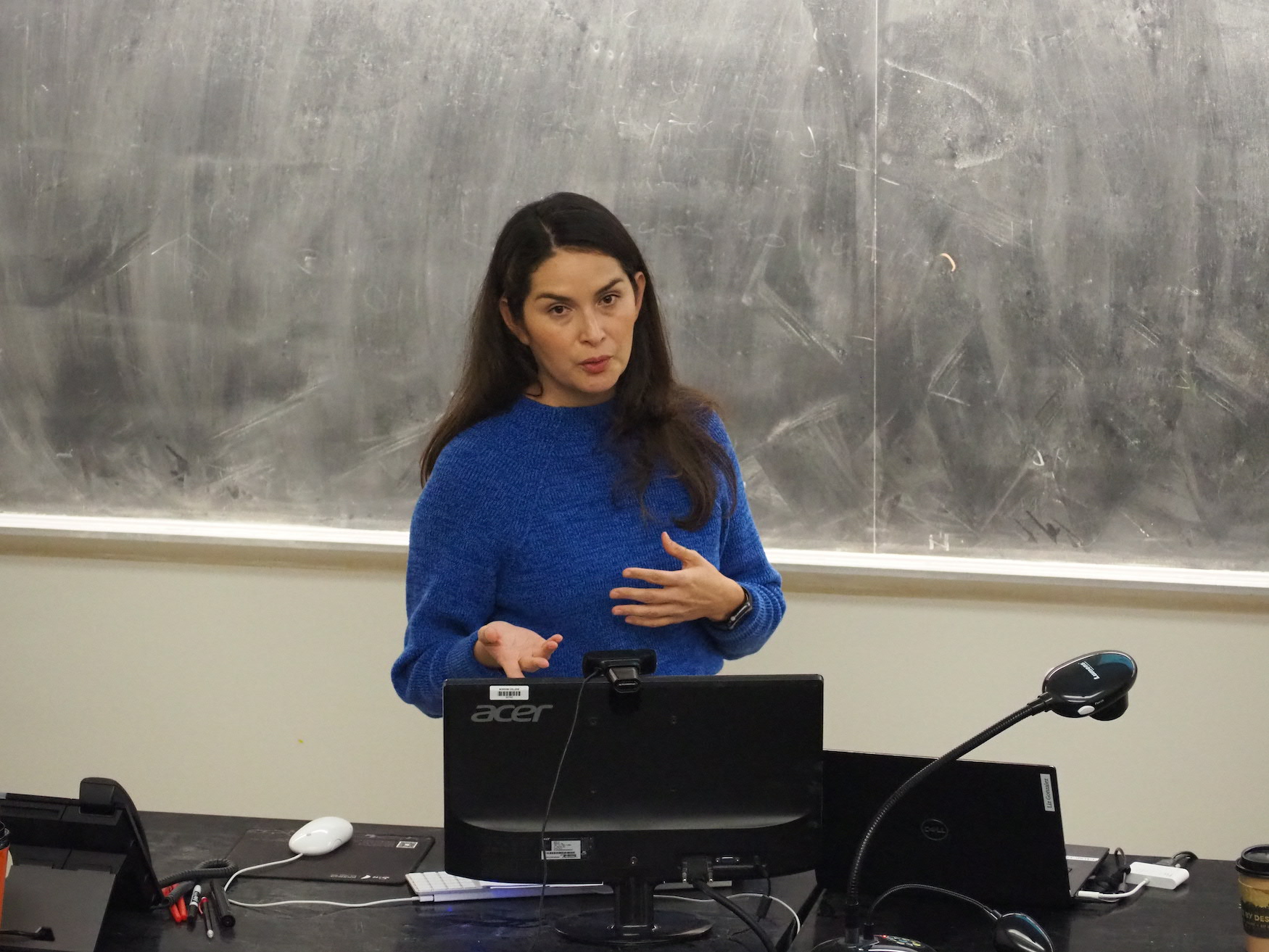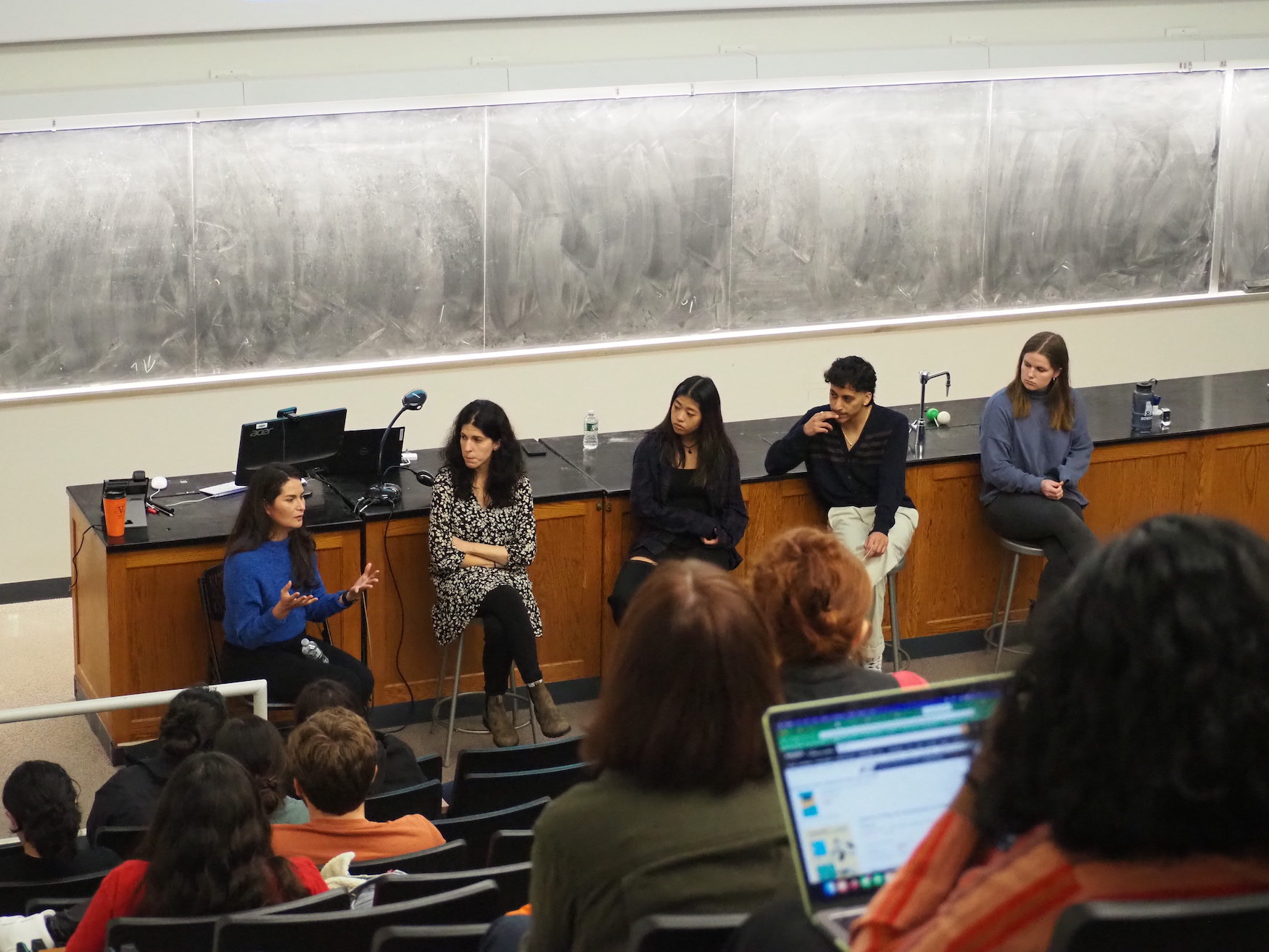Liz Gonzalez addresses immigration law, advocacy
October 28, 2022
 Chinwe Bruns
Chinwe BrunsAttorney Liz Gonzalez spoke about her journey to becoming an immigration rights advocate and the legal obstacles and injustices that immigrants face in her talk entitled “Youth, Representation and Immigrant Rights” on Wednesday.
As a Spanish major at Reed College, Liz Gonzalez never suspected that she would become a lawyer representing children in immigration court. Gonzalez, a Senior Program Associate at the nonprofit Vera Institute of Justice, works to expand legal services for unaccompanied children immigrating to the United States.
“If you ever want to have a rewarding career, immigration [law] is something that you can do. A lot of times, these kids have been betrayed by a lot of different adults in their life. This may be the first time that they feel like they can come out and explain something that happened to them,” Gonzalez said. “Being able to use that information and help them in their future here in the United States is extremely rewarding.”
Gonzalez’s first foray into law was working for a non-profit immigration firm after graduating from college. An immigrant herself, Gonzalez found this work especially rewarding.
“It’s something that I could identify with and really fueled my passion to help educate and empower the community to be able to know their rights and be able to fight back against the system,” Gonzalez said.
In hopes of further supporting immigrants, Gonzalez attended Southwestern Law School in Los Angeles. By the time she completed her degree, the number of unaccompanied children entering the U.S. was rising, so she directed her focus toward coming to their aid. However, representing children presented new challenges for Gonzalez.
“With children, they don’t tell stories the way adults do. You have to really take things from them and then piece it together to see what it is they’re talking about,” she said.
During her talk, Gonzalez described how changes in political leadership drastically affect case outcomes. She pointed to the differences in immigration policy under the Trump and Biden administrations and their impact on her work. Immigrants do not have a right to government-appointed counsel, which has prompted the Vera Institute to seek expanded access to representation.
“The majority of people are indigent people or people who can’t afford an attorney, so there is a huge need to provide free legal representation to immigrants, and we’re working really hard to expand that,” Gonzalez said.
Gonzalez also spoke about the impact of her liberal arts education in preparing her for a career in immigration law. She explained her trajectory to becoming a Spanish major as one of very few people of color at a predominantly white institution.
“Portland, Oregon … was a huge culture shock because Los Angeles is very diverse community,” she said. “I felt very out of place, and I ended up taking a Spanish literature course that I loved. I really appreciated my professor and having that connection to the Spanish language and literature and some of that culture that I didn’t feel like I had otherwise.”
Gonzalez’s talk was organized by The Bowdoin Alliance for Immigrant Rights (BAIR), The Latin American Student Organization (LASO), the Latin American, Caribbean and Latinx Studies Department (LACLaS), and the Center for Multicultural Life.

Aeri Ko ’25, a BAIR officer, noted that although Portland is a sanctuary city for refugees and while many immigrants are represented in the Bowdoin student body, Bowdoin students do not often discuss immigration.
“It’s weird that we’re surrounded by so many people directly impacted by anti-immigration laws, and it’s not more talked about. Maybe this speaker, I’m hoping, will just open the door for that,” Ko said.
LASO President Francisco Adame Perez ’24 is excited about continuing the conversation on immigrant rights with more programming like Gonzalez’s talk.
“Although immigration obviously isn’t mutually exclusive to or isn’t specific to just a Latinx issue … this is one of the events that we wanted to bring awareness about,” Adame Perez said.
For Associate Professor of Romance Languages and Literatures and Director of the Latin American, Caribbean and Latinx Studies Program Margaret Boyle, Gonzalez’s journey to immigration law provides students a real-life example of what life after a liberal arts college like Bowdoin might look like.
“I feel like students put a lot of pressure on themselves about having things figured out by the time [they] graduate from college, so I hope that more transparent conversation about the amount of time it takes to kind of figure things out, and the impactful work that you do along the way, will be really gratifying,” she said.
The various occupations and paths to supporting immigrants—whether through policy or activism—excited attendee Carolina Bragg ’26.
“I feel like we hear a lot about immigration in the U.S. and laws and what the administration is doing, but I feel like I’ve heard less about the other side of organizations that are working against incarceration of immigrants,” Bragg said.
Also in attendance was Iran Martinez ’26 who valued Gonzalez’s openness about her experiences in the context of the broader current state of immigration in the U.S.
“It’s crazy and unbelievably unfair that these things are still happening, because the government and the legal system is really not doing much to help the situation,” Martinez said.
Gonzalez shared Martinez’s frustration, noting that children who have legal representation are more likely to win their cases than children without representation. But, she also shared how efforts to increase representation are paying off.
“The disparity is huge, and not every kid has the opportunity for free legal representation,” Gonzalez said. “We’re trying to bridge that gap.

Comments
Before submitting a comment, please review our comment policy. Some key points from the policy: